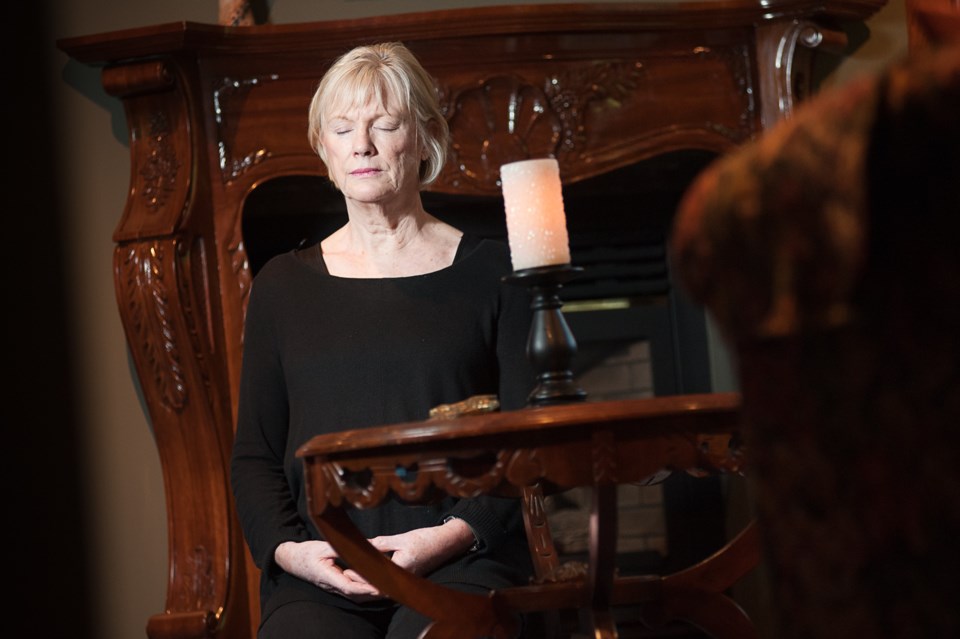Meditation is an Eastern thing, an Asian thing, that when practised by people in the West has more to do with hippies than holiness, right? That is a common misconception, according to Colleen Donald, national coordinator of the Canadian Christian Meditation Community, who says the roots of Christian meditation go back 1,600 years.
Donald grew up in Kitsilano, yet her meditation style is not rooted in the 1960s counterculture that flourished there and introduced meditation to many a Vancouverite, but in a Christian tradition from the fourth century. A lifelong Catholic, Donald discovered Christian meditation as an adult, although she acknowledges that praying on rosaries can be a sort of meditation. Come to think, medieval chanting is another form of meditation. So are labyrinths, such as the one in Chartres Cathedral.
The particular form of Christian meditation Donald practises — twice a day for 20 to 30 minutes and once a week in a group setting — is founded on the teachings of John Main, a Catholic priest and Benedictine monk, who died in 1982. The English-born Main, whose recorded teachings often start meditation meetings worldwide, spent his final years in Montreal, during which time the foundations were laid for what would become the World Community for Christian Meditation.
Donald now heads the Canadian chapter, but it is a global phenomenon that goes largely under the radar. And while Donald is (and Main was) a Catholic, the community is ecumenically Christian — welcoming believers from across denominations.
While the tradition is deep, knowledge of the practice is fairly shallow, Donald acknowledges, maybe deliberately so.
“I think that in Western Christianity the mystic stream was repressed,” she says. “I’m not a scholar on that, but I think that there was a fear of loss of control, loss of orthodoxy, fear of heretical offshoots.”
Today, there are more than 20 groups meeting regularly in B.C., including three in Vancouver. Some gather in churches, some in private homes. Learning the practice is simple, Donald says, mastering takes discipline.
At the meditation group meetings, small groups — from four to 15 or 20 — sit quietly.
“It’s very, very simple,” she says. “It’s just a matter of sitting very still and quiet and, as you begin to meditate, you breathe quietly and you repeat your mantra and every time you get a thought, or what we call a distraction, you become aware of it, you don’t glom on to the thought, you just return to [silently] saying your word.”
“Many people work at getting a twice-daily practice for years,” says Donald. “Our philosophy is that we are not looking to be perfect, we are trying to be faithful. It’s a different thing.”
Donald’s mantra, usually simply called a prayer word in Christian meditation, is “maranatha,” an Aramaic word meaning “come, Lord.”
“We repeat this word,” she says. “And through our attention and intention we join in the prayer of Christ.”
In the words of John Main: “In Meditation, then, we declare our own poverty. We renounce words, thoughts, imagination and we do so by restricting the mind to the poverty of one word.”
Donald came to Christian meditation when she realized she had lost the joy in life.
“I had lost my sense of wonder and awe about life,” she says. “I just felt like I was doing one duty after another… really missing that sort of joy and wonder that I had as a child.”
Still, if it’s just sitting in silence, why the need to meet every week to sit silently together?
“When God works in our life, when Christ works through God in our life and the spirit, we might be solitary but we are never in isolation,” she says. “When we really are cooperating with the spirit of love, we automatically begin to connect with other people and the groups reinforce this. Because it’s a discipline and it isn’t easy, it reminds you that there are other people on the same journey and it reinforces and supports.”
The movement expands when someone in a church — or increasingly, in hospitals or schools — decide to introduce the practice to their circles. A member of Donald’s group is happy to go out and provide an intro session. Groups can be led by clergy, but they need not be; anyone can do it.
Donald says years of meditative practice have taught her lessons about being loving, and not only toward others.
“It isn’t only that you learn them in relation to other people, it’s that you learn them in relation to yourself. I love meditation because it’s a radical action and a response to a lot of the idiocy of modern society, to the noise and the distraction and the lack of focus and the narcissism.
“I’m able to realize that, although there may be problems or stresses, that it is not my core and that I can deal with them, though I may not like them. It brings integration and harmony. It just gives profound meaning. It makes a pattern, it brings balance,” she says.
pacificspiritpj@gmail.com



